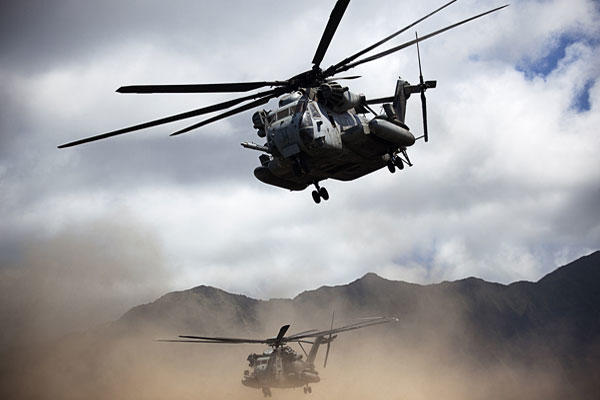Nearly a week after the Marine Corps and Coast Guard called off a search for 12 Marines who went down in a CH-53E collision off the north shore of Oahu, a small group of local civilians continues to hunt for signs of them.
The grassroots effort began a week ago when Makani Christensen, a Hawaii native and veteran Marine captain, came from his hometown Manoa on the other side of the island to offer his help with the official search. At the time, military and civilian officials, who had been combing a debris field since the choppers crashed Jan. 14, were preparing to end active search-and-rescue.
On Jan. 19, the day the official search came to an end, Christensen launched a Facebook page titled "Find our Marines." He began to recruit groups of locals to walk the now-abandoned beaches near where the choppers went down. The searchers were instructed to notify Marine officials of any debris sightings or discoveries, to operate safely and to be respectful and avoid taking photographs in case of finding remains.
Christensen said the aim of the searches was to assist military officials by finding evidence and wreckage, while holding out hope for survivors.
"'Til all the Marines are found, somebody could still be alive," he said.
A spokesman for III Marine Expeditionary Force, Capt. Timothy Irish, told Military.com he was aware of the grassroots search effort. He expressed appreciation for the volunteer work and offered a reminder to searchers not to swim out to find or recover debris, which could prove dangerous.
"We thank them for their care but remind everyone that we do have Marines standing by and ready to respond at the Wahiawa Police Department," Irish said via email. "We do not feel there is a need for a civilian led effort otherwise our own larger ground search teams would still be on scene."
The dozen Marines who were in the two choppers have been formally listed as deceased. Irish previously confirmed that remains had been located, but did not offer specifics or say whether all Marines were accounted for.
The civilian searches started small, but interest swelled. Christensen recruited searchers through the Oahu Veterans Center and garnered support from members of veterans' groups, including Team Rubicon and Team Red White & Blue.
"Everyone just mobilized and showed up," he said. "It was about the Marines, it was about the community getting involved."
The group's largest search day was Saturday. Some 300 members of the community showed up to comb nine miles of coast line. Christensen coordinated logistics with the help of veterans' groups, who defrayed the cost of portable toilets and two shuttle buses to ferry volunteers along the coast.
The day began with a traditional Hawaiian ceremony, in which conch shell trumpets, or Pu, were blown to the four corners -- north, south, east and west. A formal blessing was pronounced over the search, and volunteers burned pu kiawe, a red-berried plant that signifies remembrance.
"It was powerful," Christensen said. "It's a healing process when you're actually doing something."
So far, the search parties have recovered a CamelBak hydration pack, military cargo straps, and a few unidentified pieces of debris -- all of which have been turned over to military authorities.
Volunteer numbers waned as a new week began, but Christensen said he plans to continue walking the beaches for a few more days. Regardless of the outcome of his search effort, he said, he hopes the families of the lost Marines will receive a message of support from the civilian-led effort.
"The community is behind the families, the Marines, the military, and all our service members who put their lives in jeopardy every day to protect the freedoms we have," he said.
-- Hope Hodge Seck can be reached at hope.seck@monster.com. Follow her on Twitter at @HopeSeck.





























